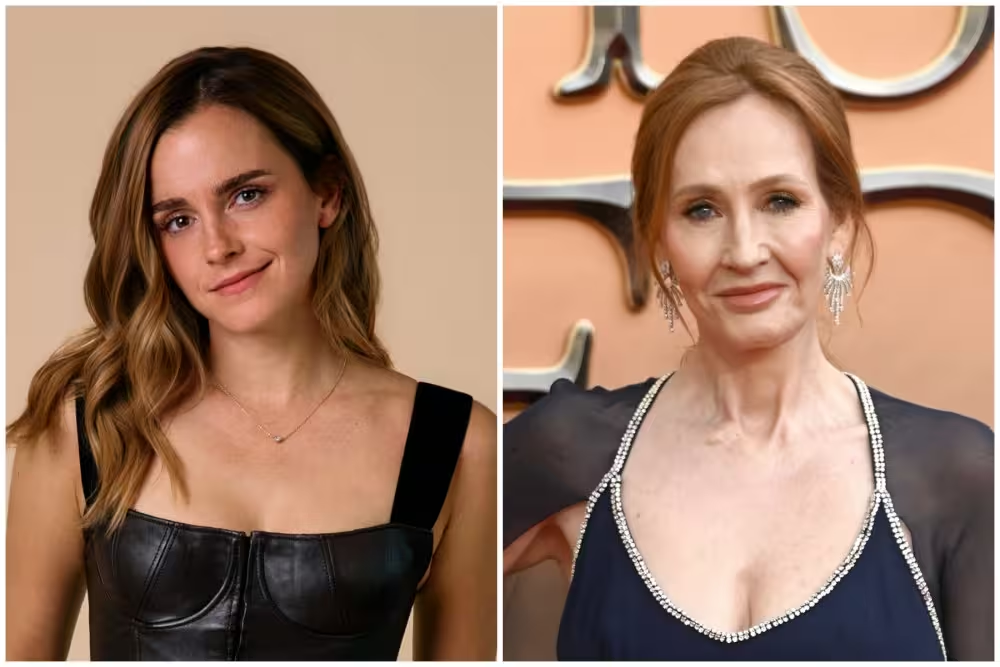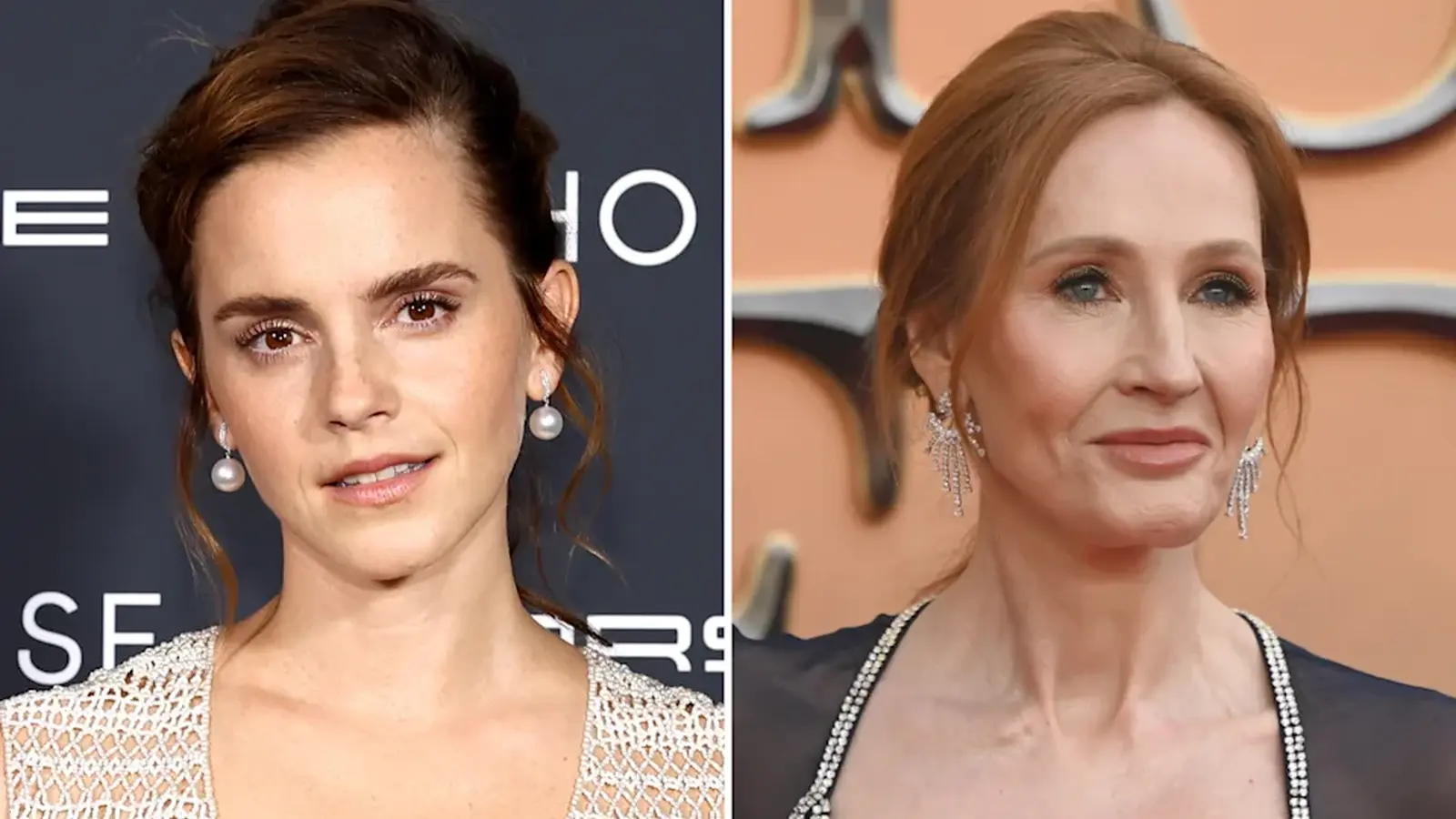8 Minutes
Emma Watson on fame, friendship and public disagreement
Emma Watson recently opened up about her fraught public relationship with J.K. Rowling in a candid interview on the On Purpose with Jay Shetty podcast. The actor — who became a global star as Hermione Granger across the eight Harry Potter films (2001–2011) — described a mix of affection for the personal memories she has of Rowling and frustration that a real conversation never took place.
Watson’s comments arrive against the backdrop of a debate that has tested the loyalties of an entire fandom. In 2020, Rowling published a series of posts and an essay that many critics called transphobic. Watson responded at the time with a short but clear statement of support for transgender people: “Trans people are who they say they are and deserve to live their lives without being constantly questioned or told they aren’t who they say they are.” That public stance put Watson at odds with Rowling — and reopened discussions about how to separate art from an artist.
Holding two truths at once
On Shetty’s podcast, Watson articulated a tension many artists and fans are learning to navigate: she still treasures her personal history with Rowling and the experience of making the films, even while rejecting some of Rowling’s public views. “I will never believe that one negates the other,” Watson said, adding that she hopes people who don’t share her opinions will still be able to love her — and that she can keep loving people whose beliefs she disagrees with.
That sentiment isn’t just personal philosophy; it’s a practical stance for anyone who grew up in a shared cultural universe. For millions, the Harry Potter films are a formative part of youth, and Watson’s comments reflect an attempt to protect that emotional connection without endorsing harmful rhetoric.
Where the conversation stalled — and why dialogue matters
Watson was candid about what hurt most: that a conversation between her and Rowling never materialized. When asked if she would still be open to a dialogue, she replied in the affirmative. The wish for conversation speaks to a larger cultural challenge: how do public figures with different views communicate in a way that is honest, accountable and constructive? In the era of social media statements and viral essays, real, private conversation can sometimes be the rarest outcome.

Context: fandom, reputations and industry fallout
Controversies around creators have a long cinematic history, but the Rowling-Watson story highlights how modern fandom complicates legacy. Unlike disputes hidden from public view, this one played out in real time, with fans, co-stars and industry figures weighing in. Daniel Radcliffe publicly criticized Rowling’s comments in 2020, underlining that different members of the original cast have taken distinct public positions. Other actors reacted more subtly, and many fans have chosen to separate the films from the author while others have called for boycotts.
This pattern isn’t unique. Similar tensions have emerged when directors, writers or actors express divisive opinions — the result is often a split in how audiences consume and remember a piece of work. The difference with Harry Potter is the scale: the franchise is a global cultural touchstone spanning books, films, and a sprawling fan community.
Watson’s hiatus and the toll of promotion
Beyond the Rowling controversy, Watson offered insight into why she’s been largely absent from cinema for seven years. In interviews she has described missing the craft of acting — the work itself — while growing weary of the relentless cycle of promotion that often accompanies major films. "I do not miss selling things. I found that to be quite soul-destroying," she told Hollywood Authentic.
Her comments underscore a broader industry reality: for many established actors, the workload extends far beyond shooting. Press tours, marketing obligations and commodification of art can sap creative joy. Some actors step back to preserve mental health or pursue other interests; others return reinvented. Watson’s break has been one of personal recalibration rather than retirement.
How fans and cinema culture respond
The fan community’s reaction to the rift has been layered. Many viewers continue to rewatch and celebrate the films for their storytelling and performances, treating them as separate from Rowling’s personal views. Others argue that continued fandom without accountability risks normalizing harmful statements from creators. This debate reflects a larger cultural movement toward evaluating not just the artwork but the ethical footprint of its creators.
Behind the scenes, the Harry Potter brand has diversified into theme parks, stage plays and spin-offs, offering fans multiple ways to engage with the world without centering Rowling’s public voice. Streaming and reissues also complicate the economics and ethics of consumption: how platforms and studios choose to present legacy content influences how new audiences discover it.
Comparisons and industry perspective
Watson’s stance is reminiscent of other moments when artists have publicly distanced themselves from creators while defending their craft. The entertainment industry has seen actors and collaborators navigate public disagreements — sometimes leading to creative reinventions, sometimes to lasting estrangement. The difference in the Watson-Rowling case is the potent mix of childhood nostalgia, the global reach of the franchise, and the moral stakes of the debate over transgender rights.
Cinema historian Marko Jensen offers a perspective: "When a cultural landmark like Harry Potter becomes the stage for social debate, the dispute extends beyond two people — it tests how we value art and whom we hold accountable. For actors, choosing to speak or remain silent can reshape their public identity as much as any role."
Trivia and behind-the-scenes notes
- Emma Watson was cast as Hermione at age nine and grew up publicly in the role across a decade of filmmaking.
- The eight-film series was shot across multiple countries and transformed the main cast into household names almost overnight.
- Fan communities have created detailed guides and viewing events aimed at separating the films’ artistic merits from the author’s private views — a grassroots cultural coping mechanism.
What might come next?
Watson’s openness to dialogue leaves the door ajar for reconciliation, but any meeting would be complicated by public attention and the ethical dimensions at stake. For now, Watson appears focused on a personal balance: preserving treasured memories, standing by her principles, and weighing when — and how — she will return to acting.
As audiences, critics and industry insiders watch how this story continues to unfold, one thing remains clear: the relationship between creator and creation is no longer straightforward. In a media landscape where opinions travel worldwide in seconds, the question of how to engage with beloved films when their creators are controversial will persist.
"I believe in conversation," Watson told Shetty. It's an aspiration that many in film and fandom share — even when the path to genuine dialogue looks uncertain.
"Emma Watson’s position is emblematic of a modern actor’s dilemma: loyalty to formative art versus responsibility to a wider public. Navigating that line is one of the defining cultural tasks of our moment," says film critic Anna Kovacs.
Whether Watson returns to major studio filmmaking soon or continues to pick projects more sparingly, her recent remarks remind us that fame, friendship, and principles often intersect in messy, human ways.
Source: variety


Leave a Comment